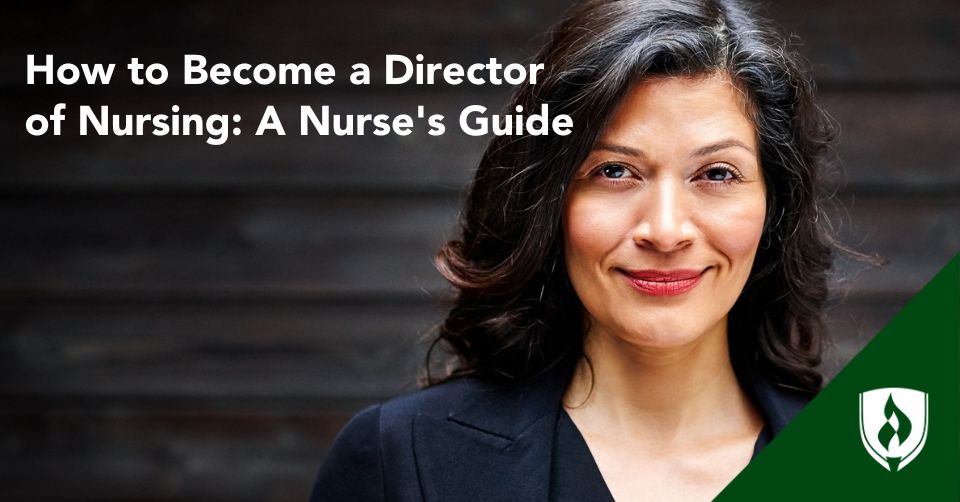
There’s a lot to like about nursing practice. But one of the best things about nursing as a career is how much opportunity there is to advance and change your career over time.
If you're interested in becoming a director of nursing, then moving into leadership is your kind of change.
If you already have nursing experience or have worked in healthcare services in any capacity, you might already have an idea of some of the potential steps a prospective director of nursing needs to take.
But you should know right from the jump—this is a marathon, not a sprint. Keep reading to find out what that marathon might look like.
1. Become a registered nurse (RN)
If you aren't already an RN, this is definitely step one.
The nursing profession tends to build on both education and experience, and the licensure (and experience) of a registered nurse is a common foundation necessary to advance.
Becoming a registered nurse means graduating from a nursing degree program (choose a bachelor's program if you're interested in leadership roles) and passing the National Council Licensure Examination (NCLEX-RN®).
If you are starting here, check out How to Get Into Nursing School: Your Step-by-Step Guide.
2. Earn a bachelor's of science in nursing (BSN)
Registered nurses can get to their licensure through both an associate's degree or bachelor's degree program. If you took the associate degree path to become an RN, you will need to return to nursing school for a bachelor's of science in nursing degree.
While requirements will vary depending on the employer and the type of nursing services they provide, director of nursing positions are typically seeking applicants with graduate degrees like a master's degree or a doctoral degree, according to the American Nurses Association® (ANA).1
Getting into those types of graduate programs will require a bachelor's degree.
But you don't have to start all over. There are plenty of RN to BSN programs to help working nurses round off their bachelor's degree.
3. Build leadership experience in clinical and administrative roles
Education is critical to go into nursing leadership, but it isn’t the only thing that matters. As you might expect, experience is also an important factor for would-be nursing directors.
While every aspect of nursing practice is useful experience, gaining some formal responsibility in your healthcare facility is an excellent way to develop leadership skills and decide if leadership and nursing administration is something you really want.
You could look for leadership roles like unit lead or nursing supervisor or nurse manager.2
Experienced RNs are often excellent candidates for director of nursing roles for obvious reasons—they've walked the walk and know how to handle the daily challenges a nursing unit faces. Of course, there’s still a learning curve involved as nursing staff branch out into more of the administrative functions of this role.
One good option for this stage of your nursing career is to join a national association like the American Nurses Credentialing Center® (ANCC) and take a course in leadership topics, work on a nursing board or even volunteer for policy and advocacy initiatives around nursing. This kind of nursing work can help you understand the issues you'd be facing as a director of nursing, as well as signal your interest in more leadership to your employer.
If leadership positions are hard to come by in your healthcare system, administrative and leadership roles with employers like a nursing home could be a good way to gain some of those critical skills.
4. Key traits for effective nursing leadership
While you are gaining your work experience in the nursing department, develop yourself in the areas that will be most relevant to your future goals.
Here are some of the qualities important for any nursing director.
Professionalism
Above all else, you must be able to do your job professionally, and not let the frustrations or complaints of other healthcare professionals or patients cause you to falter and lead to further issues.
Aspiring nursing directors need the ability to leave themselves at the door and focus 100 percent on the task at hand—ensuring quality care for patients and their families. Leaders cannot let petty personal issues or lapses of accountability get in the way of their teams’ work.
Compassion
Having compassion for your patients and their families is a part of any nursing position. But as a director of nursing, you’ll need to have compassion for your team of RNs as well. A good director of nursing can empathize with teammates and keeps in mind the pressures and challenges they face in their daily work.
Problem-solving
A director of nursing needs to be adept at problem solving to come up with solutions to critical issues nurses face in the hospital. Anything from nursing shortages, pandemic adjustments, safety training, nursing budget problems or nursing burnout could appear on a nursing director’s agenda.
Keeping priorities balanced can be a significant challenge as well. You'll try to protect the health and wellbeing of your nursing staff, while also following budget restraints from the healthcare institution you work for, while also trying to enhance patient care and clinical outcomes while also satisfying state and federal regulations for every area of healthcare you manage.
It's not easy. And keeping everyone happy can be impossible. At the end of the day, a nursing director (sometimes with the guidance of a chief nursing officer or executive nursing administration) has to make tough calls.
5. Earn a master's of science in nursing (MSN degree)
Most director of nursing positions will ask for applicants who have at least an MSN degree.
A master’s in nursing be completed in as few as 18 months.3 In the case of Rasmussen's program, it's also online and was designed to fit into a working nurse's life.
During an MSN program, you could specialize in Nursing Leadership and Administration to focus on the business side of nursing. You'll learn about human resources and performance management as it pertains to nurses, as well as the financial side of things.
Many of the people who come into nursing do not like administrative concerns, so if you are still interested at this point, that's a good sign!
Get more details about tuition and timing at our Master of Science in Nursing degree program page.
Essential skills for a director of nursing
Just like many other overseeing positions, directors of nursing need management skills and the ability to communicate and delegate tasks. They also need a broad knowledge base--including knowledge of almost every nursing job description, healthcare regulations, innovations in nursing science and best practices in nursing operations. To name a few things.
Specifically, a nursing director should have competency in...4
- Patient care
- Budgeting
- Long-term care
- Conflict mediation
- Performance management and staff motivation
- Scheduling
- Supervisory skills
- Quality assurance and control
- Policy development and procedure implementation
- Reporting for healthcare outcomes
- Emergency preparedness and crisis management
- Care planning
- Legal compliance
- Healthcare informatics
- Data-driven decision making
According to the Bureau of Labor Statistics, health services managers and professionals in healthcare administration also need technical skills, not only to use platforms like Electronic Health Records (EHR) with proficiency (ex: Epic®, Cerner®), but also to review and evaluate healthcare metrics and interpret that data for insights.5
Is a leadership role in nursing the right fit?
No matter where you are in your nursing career currently, know that a director of nursing role will require significant education and experience. This is not a job you can walk into after 5 years of being a nurse. It will take dedication to get there.
You need years of clinical nursing experience before you can take on administrative duties that will truly benefit the nurses you oversee. The more clinical expertise you have, the better you'll be able to understand the real scope of your decisions as a director of nursing.
Here are some questions to ask yourself if you think you might be interested in a high-level leadership role like nursing director...
- Am I willing to work towards this for decades?
- Do I have the patience for healthcare administration?
- Do I have ideas to improve patient outcomes where I work now?
- Do I have ideas to improve nursing policies and can I anticipate objections to those ideas?
- Am I okay with eventually moving beyond clinical nursing experience and not seeing patients as much?
- Do other nursing professionals rely on me for guidance, advice or help?
- Am I willing to gain the business knowledge I'd need to shape department budgets and nursing salaries?
- Do other nursing leaders inspire me?
If you answered "yes" to most of those, you might have what it takes to advance into nursing leadership and administration and maybe become a director of nursing someday.
Supporting the nursing workforce through leadership
A nursing director isn't just a bureaucrat writing policies. They are a leader who will set the tone for all the nurses with their employer. If you make it clear that supporting nurses and making sure their work is as amazing and effective as possible, you can inspire the kind of nursing workforce everyone wishes to be part of.
Someone needs to do these leadership roles. Why couldn't it be you someday?
If you’d like to learn more about the Rasmussen University Master of Science in Nursing program, check out 8 Things You Didn’t Know About the Rasmussen University Master of Science in Nursing Program.
NCLEX-RN is a registered trademark of National Council of State Boards of Nursing, Inc.
American Nurses Association® is a registered trademark of American Nurses Association.
1How to Become a Director of Nursing, April 28, 2023, ANA https://www.nursingworld.org/content-hub/resources/nursing-resources/how-to-become-a-director-of-nursing/
2Leadership in Nursing: Qualities & Why It Matters (May19, 2023) ANA https://www.nursingworld.org/content-hub/resources/nursing-leadership/leadership-in-nursing/
3Completion time is dependent on the number of courses completed each term.
4Top Director Of Nursing Skills to Include in Your Resume (With Examples), CVOWL [accessed January 2026] https://www.cvowl.com/blog/skills-for-director-of-nursing-resume
5Bureau of Labor Statistics, U.S. Department of Labor, Occupational Outlook Handbook, [accessed January 2023] https://www.bls.gov/ooh/management/medical-and-health-services-managers.htm#tab-4 Information represents national, averaged data for the occupations listed and includes workers at all levels of education and experience. Employment conditions in your area may vary.




